|
|
|
Sort Order |
|
|
|
Items / Page
|
|
|
|
|
|
|
| Srl | Item |
| 1 |
ID:
107292
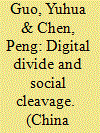

|
|
|
|
|
| Publication |
2011.
|
| Summary/Abstract |
During its structural transformation, rural China witnessed the emergence of four types of village: traditional, industrialized, commercial and villages in cities. Information Communication Technologies (ICTs), including fixed phones, cell phones, television sets and the internet (with personal computers), are now commonly used in Chinese villages but in ways that differentiate villagers according to variables such as occupation, villager membership and social status. The adoption of ICTs by peasants not only represents but also accelerates growing peasant differentiation; in other words, the function of ICTs could not penetrate the barrier of social structure. Meanwhile, structural transformation in China has been an activator to shaping peasants' diversified ideas about information, and the demand for and usage of ICTs. An analysis of peasants' ICT adoption thus enables us to identify the basic trends and characteristics of social transformation in contemporary China.
|
|
|
|
|
|
|
|
|
|
|
|
|
|
|
|
| 2 |
ID:
173760


|
|
|
|
|
| Summary/Abstract |
The digital divide's implications on health inequality among American Military veterans has been discussed extensively in research; however, it remains unclear what is the association between Internet usage and health specifically among Veterans. We examine this question by addressing the growing digital gaps in the veteran population, looking at the association of Internet use and self-reported health. Using the National Survey of Veterans we find that compared to those who use the Internet daily, those who use the Internet less frequently have significantly higher odds of reporting “fair” or “poor” self-rated health. The significant association remained when demographic, socioeconomic, and military factors were controlled. While our results indicate that veterans that use the Internet more frequently report more favorable self-reported health, given our data we are unable to distinguish a causal relationship. We conclude by discussing potential policy interventions, targeting helping those who are left behind.
|
|
|
|
|
|
|
|
|
|
|
|
|
|
|
|
| 3 |
ID:
151819


|
|
|
|
|
| Summary/Abstract |
This article examines the gendered digital divide in Israel in the age of the radiophonic cyber-revolution. The research focuses on increased listening patterns to on-demand, radiophonic content via online radio. Recent years have witnessed a shift in the second level of the gendered digital divide. This shift is effectively captured by the notion of ‘can’t’ transforming into a ‘don’t want to be bothered’ mindset. To explore this phenomenon an online survey was conducted on online listeners of a regional radio station. Israel’s top-rated regional station, 103FM-Non-Stop Radio, was selected. The survey was conducted in April 2014. A total of 2013 listeners were surveyed: 1491 men and 522 women. Our results found that for the under 35 years of age listeners increased listening patterns were gender-blind. The same conclusion was reached for other demographic groups: The findings from this group do, in fact, attest to a gendered digital divide. The key demographic groups here are married couples and parents. These trends highlight the continued need for further research into online radio listening patterns and their relationship to gender-related differences in the digital age.
|
|
|
|
|
|
|
|
|
|
|
|
|
|
|
|
| 4 |
ID:
180247
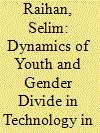

|
|
|
|
|
| Summary/Abstract |
This article identifies the nature of gendered digital divides between male and female youth (aged 15–29) in the context of Bangladesh. As a measuring indicator for technology inclusiveness, this study examines whether a young male or female owns a mobile phone, the most basic means of accessing the Internet. As observed in the descriptive analysis, on average, 46% of young females have a mobile phone, compared to 79% young males. However, such disparity varies across age cohorts and the divides of rural–urban, poor–non-poor, richer–poorer income deciles, etc. To understand whether there is any significant discrimination against women in terms of technology inclusiveness, this study applies the Blinder–Oaxaca (B–O) decomposition technique. The decomposition analysis shows statistically significant discrimination against women in terms of mobile ownership at both the household and the individual level. The factors such as remittances, average years of schooling of the household members, urban residence, household’s income status, etc., significantly reduce discriminatory behaviour towards young females.
|
|
|
|
|
|
|
|
|
|
|
|
|
|
|
|
| 5 |
ID:
090326
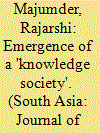

|
|
|
|
|
| Publication |
2009.
|
| Summary/Abstract |
In recent times knowledge has been recognised as a major source of efficiency, competitiveness, and economic growth and the resulting 'Knowledge Society' is supposed to be more egalitarian. Whether this happens depends on the level of penetration of the 'Knowledge Economy' (KE), its linkage with other sectors, the nature of the jobs created, and whether different stratum of society benefit from it equally. This paper uses the Indian experience to shed light on these issues. While huge potential for transition to a Knowledge Society exists in India, it would have to be preceded and accompanied by enabling policies such as investment in scientific research, standardisation of working conditions, and the building up of physical and social infrastructure.
|
|
|
|
|
|
|
|
|
|
|
|
|
|
|
|
| 6 |
ID:
120604
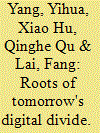

|
|
|
|
|
| Publication |
2013.
|
| Summary/Abstract |
This paper explores China's digital divide, with a focus on differences in access to computers, learning software, and the Internet at school and at home among different groups of elementary school children in China. The digital divide is examined in four different dimensions: (i) between students in urban public schools and students in rural public schools; (ii) between students in rural public schools and students in private migrant schools; (iii) between migrant students in urban public schools and migrant students in private migrant schools; and (iv) between students in Han-dominated rural areas and students in areas inhabited by ethnic minorities. Using data from a set of large-scale surveys in schools in different parts of the country, we find a wide gap between computer and Internet access of students in rural areas and those in urban public schools. The gap widens further when comparing urban students to students from minority areas. The divide is also large between urban and rural schools when examining the quality of computer instruction and access to learning software. Migration does not appear to eliminate the digital divide, unless migrant families are able to enroll their children in urban public schools. The digital divide in elementary schools may have implications for future employment, education and income inequality in China.
|
|
|
|
|
|
|
|
|
|
|
|
|
|
|
|
| 7 |
ID:
171923
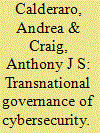

|
|
|
|
|
| Summary/Abstract |
Connectivity infrastructure is constantly expanding, increasing internet access across countries, regions and socio-political contexts. Given the fast-changing geography of the internet, there is a growing demand to strengthen cyber capacity beyond national frameworks, in order to develop a transnationally coherent and coordinated governance approach to cybersecurity. In this context, cyber capacity building initiatives are increasingly central in international debates, with the ambition to support countries in the Global South in fostering their cybersecurity strategy from technical and policy perspectives. This article discusses the key factors explaining states’ efforts to enhance their cyber capacity. Based on a cross-national quantitative research approach, the findings contradict international relations (IR)-derived approaches to cybersecurity, which assume that countries develop their cyber capacity according to external security threats, domestic politics or norms. In line with existing research on the role that science plays in policymaking processes more broadly, our results suggest instead that a country’s science and technical knowledge is the most robust explanation for that state’s cyber capacity level. These findings emphasise the need for policymakers to support countries in the Global South in developing their cyber capacity beyond national security paradigms by strengthening education and technical skills in contexts lacking in this resource.
|
|
|
|
|
|
|
|
|
|
|
|
|
|
|
|
| 8 |
ID:
171879


|
|
|
|
|
| Summary/Abstract |
The emergence of a digital divide or a lack of internet access may hinder urbanization and adversely affect growth. However, fintech development can help to improve the accessibility and affordability of financial services, particularly for sections of the population formerly excluded from such services. Improved access is expected to stimulate the growth essential for promoting urbanization, possibly alleviating the negative impacts of a digital divide and creating a trickle-down effect. This paper is among the first to investigate the effect of fintech development on urbanization, as indicated by labor transfer from agricultural to non-agricultural sectors in China. It is found that: (i) the digital divide hindered, while fintech development contributed to urbanization; (ii) the positive effect of fintech development on urbanization affects individuals both with and without access to the internet, yielding the so-called trickle-down effect and thus helping to alleviate the negative consequences of a digital divide; and (iii) regarding transmission mechanisms, fintech development helps to generate additional jobs and raise income in non-agricultural sectors, stimulating urbanization even for those without access to the internet.
|
|
|
|
|
|
|
|
|
|
|
|
|
|
|
|
| 9 |
ID:
108455
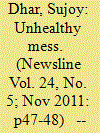

|
|
|
| 10 |
ID:
097629


|
|
|
|
|
| Publication |
2010.
|
| Summary/Abstract |
What is the impact of the possibility of political participation on the Internet on long-standing patterns of participatory inequality in American politics? An August 2008 representative survey of Americans conducted by the Pew Internet and American Life Project provides little evidence that there has been any change in the extent to which political participation is stratified by socio-economic status, but it suggests that the web has ameliorated the well-known participatory deficit among those who have just joined the electorate. Even when only that subset of the population with Internet access is considered, participatory acts such as contributing to candidates, contacting officials, signing a political petition, or communicating with political groups are as stratified socio-economically when done on the web as when done offline. The story is different for stratification by age where historically younger people have been less engaged than older people in most forms of political participation. Young adults are much more likely than their elders to be comfortable with electronic technologies and to use the Internet, but among Internet users, the young are not especially politically active. How these trends play out in the future depends on what happens to the current Web-savvy younger generation and the cohorts that follow and on the rapidly developing political capacities of the Web. Stay logged on …
|
|
|
|
|
|
|
|
|
|
|
|
|
|
|
|
|
|
|
|
|